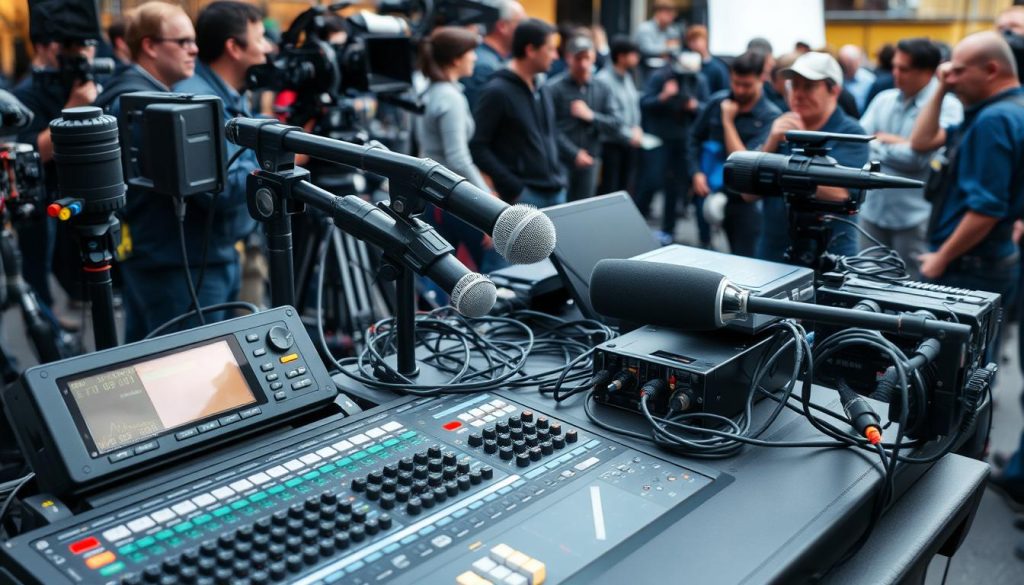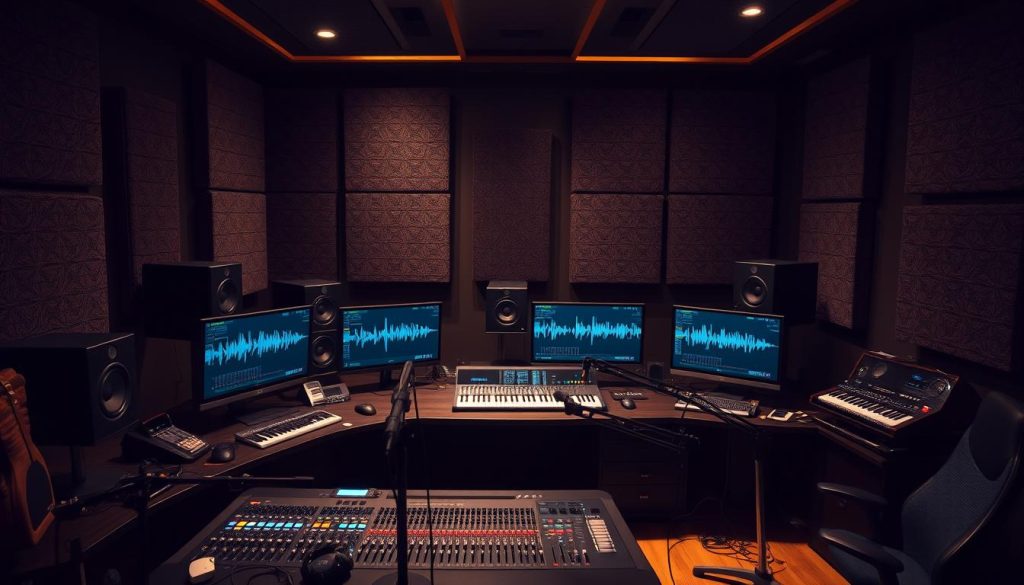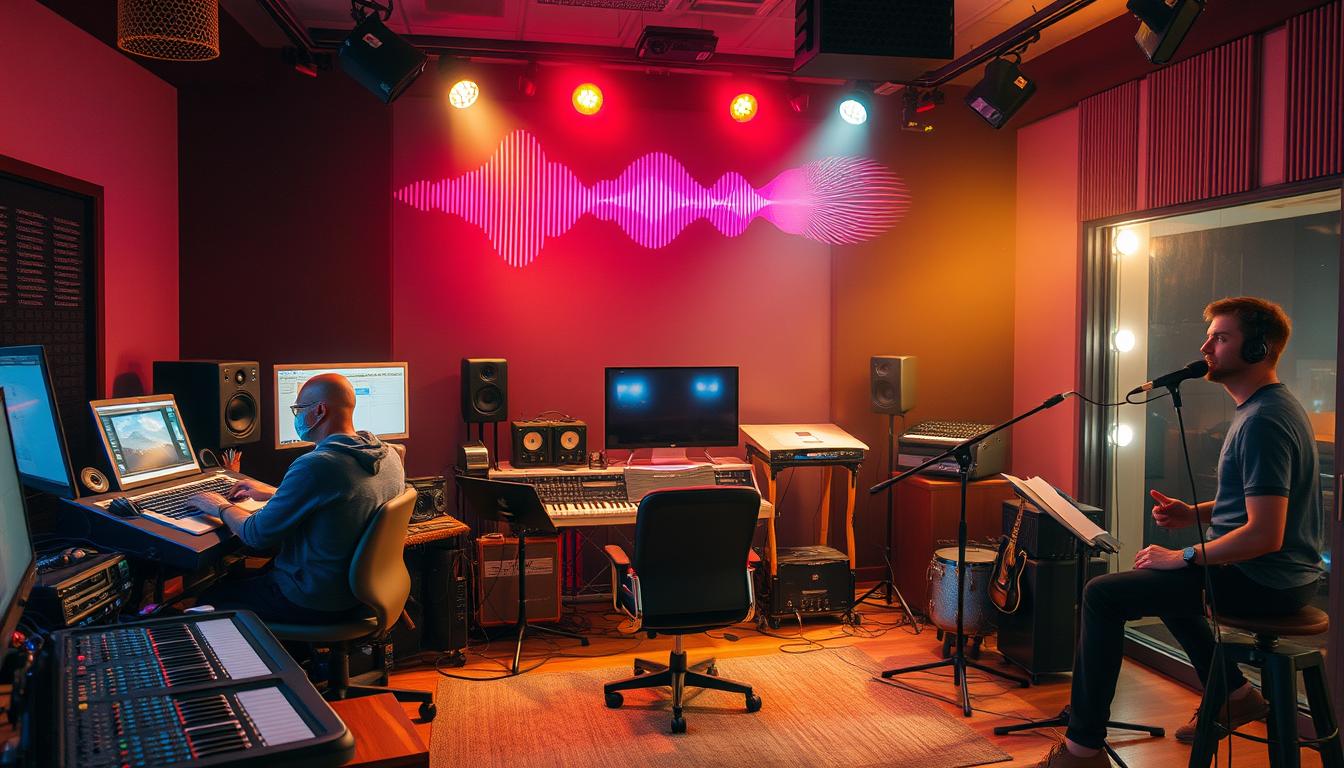I’m thrilled to explore the world of sound production. It’s key in making movies feel real and emotional. Sound designers use sounds like dialogue and music to make stories come alive. They work with many people to make the sound fit the movie perfectly.
Sound production has many important jobs. Production sound mixers record sounds on set. Audio engineers work on music and sound effects. Each job is vital to the movie’s sound.
I’m excited to learn more about sound production. I’ll look at the different jobs and what they do. I want to show how sound makes movies special. By learning about sound design and production, I hope to reveal the magic of audio in films.
The Significance of Sound Design in Filmmaking
Making a movie is complex, and sound design is key. It adds depth beyond what we see. Film sound design, movie soundtracks, and Foley sound effects make the movie more real and engaging.
Setting the Tone: The Power of Musical Scores
Movie scores are powerful. Composers use music to make us feel, increase suspense, and set the mood. Sound designers pick and mix these sounds to match the action on screen. This creates a perfect blend that touches the audience.
Crafting Authenticity: The Art of Foley
Foley sound effects are crucial but often overlooked. Foley artists create real sounds that match what we see on screen. They make things like footsteps or breaking glass sound real. This makes the movie feel more real.
Sound designers mix dialogue, ambient sounds, and music to make movies engaging. Their work in film sound design, movie soundtracks, and Foley sound effects turns ordinary into extraordinary. This makes movies more powerful and exciting.
Diving into the Role of a Production Sound Mixer

A production sound mixer is key to making films or TV shows great. They make sure the sound quality is top-notch. They work hard to create a mix that makes the movie magic happen.
Core Responsibilities of a Production Sound Mixer
A production sound mixer does many important jobs. They plan the sound before filming starts. They set up and test audio gear. They lead the sound team on set.
They record all sounds like dialogue and effects. They mix the sounds to make a great audio mix.
- Careful planning of production sound during the pre-production stage
- Arranging and testing all necessary audio recording equipment
- Supervising and coordinating the sound crew on set
- Meticulously recording dialogue, sound effects, and ambient sounds during principal photography
- Mixing and balancing the production sound to create a cohesive, high-quality audio mix
Essential Skills for a Production Sound Mixer
To be great, a production sound mixer needs both tech skills and creativity. They must know a lot about sound and how it works. They should be good with audio gear and know how to fix problems.
They also need to make the sound in a scene better. And they must work well with others, like the director and camera team.
- Comprehensive understanding of the physics of sound and its behavior in various environments
- Proficiency in the operation and troubleshooting of advanced audio recording equipment
- Skilled audio mixing and sound design capabilities to enhance the emotional impact of a scene
- Effective communication and problem-solving skills to coordinate with the director, cinematographer, and other crew members
The production sound mixer is a key part of making movies. They make sure the sound pulls you into the story. With their audio engineering skills and hard work, they help bring the director’s dream to life.
Embarking on a Career as a Sound Engineer
Are you dreaming of becoming a sound engineer? This career lets you mix tech skills with your love for music. You’ll be key in making music, movies, live shows, and games sound amazing.
Sound engineers work in many places, from studios to live events. You need to be flexible and know a lot about audio tech. Your job is to make sure the sound is perfect, whether it’s in a recording or live.
Want to work in audio production or audio technology? There are many chances to grow. You’ll work with artists and directors, making sounds that move people. If you love sound, this career is for you.
roles in sound production

Sound engineers work in many places, each with its own challenges. They go from recording studios to live music venues and film shoots. They need to be flexible and skilled in different settings.
Sound engineers work with many people like producers and musicians. Good communication and teamwork skills are key. Thanks to digital tech, they can work from anywhere, making their work fit their needs.
Versatility in Sound Production Roles
Sound engineers work in many places, each with its own tasks. These include:
- Recording studios, where they capture and mix high-quality audio for music, podcasts, and other productions
- Live event venues, where they ensure great sound quality for concerts and festivals
- Film and television productions, where they add audio that makes the story come alive
- Broadcast facilities, where they mix audio for radio, TV, and online platforms
- Post-production studios, where they edit and finalize audio for various media
No matter where they work, sound engineers need to know a lot about audio engineering. They must have a great ear for details and solve problems quickly to do their best work.
The Evolving Role of Sound Engineers
The audio industry is always changing. Sound engineers need to keep up with new tech and trends. They must learn new things and improve their skills to stay ahead.
Sound engineers are key in shaping the sound of projects. They use their skills to make sound creative and powerful. This shows how important they are in sound production.
Mastering the Challenges of Sound Engineering
Being a sound engineer means blending technical skills with creative art. It takes a sharp eye for details, a deep knowledge of audio tech, and quick thinking. The job can be tough, but making great sound is very rewarding.
Is Sound Engineering a Good Career Path?
Sound engineering is a great career despite its challenges. It’s in high demand, with a 7% growth rate expected in the U.S. over ten years. You can work on movies, TV, music, or live events.
The job comes with tight deadlines and high stress. But, making amazing soundscapes and enhancing experiences is very fulfilling. If you love audio and are willing to learn, this career is rewarding.
As an audio engineer, I’ve found success comes from technical skill, problem-solving, and creativity. You need to know a lot about acoustics and audio gear. Working well with others is also key.
| Key Challenges of Sound Engineering | Strategies for Success |
|---|---|
| Tight Deadlines and High-Pressure Environments | Effective time management, prioritization, and the ability to work under pressure |
| Rapidly Evolving Audio Technology | Continuous learning, adaptability, and a willingness to stay up-to-date with industry trends |
| Attention to Detail and Consistency | Meticulous attention to audio quality, maintaining a keen ear, and a commitment to excellence |
| Collaboration with Cross-Functional Teams | Strong communication skills, the ability to understand diverse perspectives, and a collaborative mindset |
The challenges in sound engineering are big, but the rewards are too. By overcoming these challenges, engineers make amazing audio experiences. This career lets you master tech and express your creativity.
The University of Silicon Valley: Shaping Cinematic Brilliance
At the University of Silicon Valley, I’ve found a place full of innovation and creativity. It’s perfect for those who love audio and music technology. Here, we learn the art and science of sound design for films.
This place teaches us the 5 Elements of Sound Design. It gives us the skills to shape the future of movies. I’m excited to be part of this community.
The film sound design programs here show me how sound changes movies. They teach me how to make real Foley effects and music scores. This makes me want to help tell stories through sound.
At the University of Silicon Valley, I’m always learning new things. The Audio and Music Technology Department teaches me the basics of sound engineering. This helps me face the challenges of this exciting field.
Every class and project makes me more confident. I’m ready to use my skills in the real world. I’m grateful for the resources and the knowledge of the teachers here.

